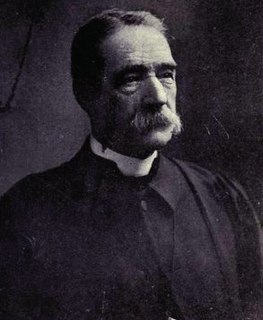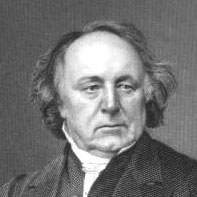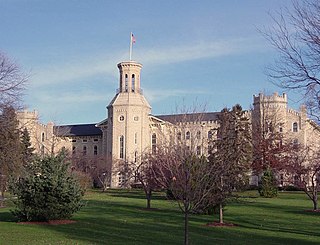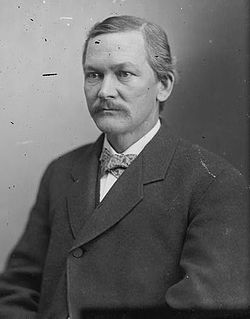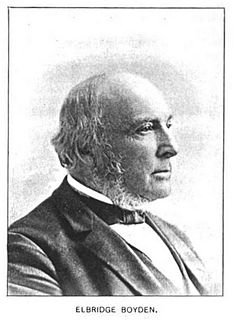Edward Breathitte Sellers is the first known college graduate of color of Wheaton College and one of the first African American graduates in the state of Illinois.
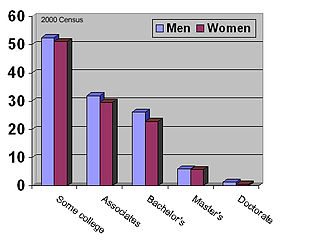
Bachelor's degree or higher is a commonly used term by the United States Census Bureau and other U.S. government agencies on the federal as well as state and local level. The term describes the portion of the population that has either a bachelor's degree or a higher degree such as a master's or doctorate degree. In 2017, 33.4% of the population over 25 years old in the United States had a bachelor's degree or higher.

Wheaton College is a Christian, residential liberal arts college and graduate school in Wheaton, Illinois. The Protestant college was founded by evangelical abolitionists in 1860. Wheaton College was a stop on the Underground Railroad and graduated one of Illinois' first African-American college graduates.

Illinois is a state in the Midwestern region of the United States. It has the 5th largest Gross Domestic Product by state, is the 6th-most populous U.S. state and 25th-largest state in terms of land area. Illinois is often noted as a microcosm of the entire United States. With Chicago in the northeast, small industrial cities and great agricultural productivity in northern and central Illinois, and natural resources such as coal, timber, and petroleum in the south, Illinois has a diverse economic base, and is a major transportation hub. Chicagoland, Chicago's metropolitan area, contains over 65% of the state's population. The Port of Chicago connects the state to other global ports around the world from the Great Lakes, via the Saint Lawrence Seaway, to the Atlantic Ocean; as well as the Great Lakes to the Mississippi River, via the Illinois Waterway on the Illinois River. The Mississippi River, the Ohio River, and the Wabash River form parts of the boundaries of Illinois. For decades, Chicago's O'Hare International Airport has been ranked as one of the world's busiest airports. Illinois has long had a reputation as a bellwether both in social and cultural terms and, through the 1980s, in politics.
Edward Breathitte Sellers was said to have been born in Mississippi around 1842. Born and reared in slavery, somehow prior to his matriculating at Wheaton College, he moved to Illinois and listed Shawneetown, Illinois as his home. He appears in the 1860 census for DuPage county and is listed as a laborer. His race is noted as white.

Shawneetown is a city in Gallatin County, Illinois, United States. The population was 1,239 at the 2010 census, down from 1,410 at the 2000 census. It is the county seat of Gallatin County.
Initially in 1860, he began studies in the Preparatory program as a junior student and progressed to senior standing the following year. In the 1862 Wheaton College Catalog, he is shown to have entered the Collegiate program and is listed as a Freshman.

A freshman, first year, or frosh, is a person in the first year at an educational institution, usually a secondary or post-secondary school.
That same year he joined the Beltionian Literary Society. [1] Founded in 1856, the crimson-clad Belts championed the cause of "striving for the greater and better." It was in the literary society that Sellers was able to hone his oral and written communication skills as he debated his fellow students on topics ranging from economics to ethics, such as the lawfulness of slavery. Sellers held leadership positions within the society and gained a reputation as “one of the leading disputants” on campus.
During his junior year at Wheaton College, Sellers joined several of his classmates and heeded the call of the Union Army for "hundred-days men." Sellers, along with his friends, enlisted May 18, 1864 in the 132nd Illinois Volunteer Infantry Regiment. This regiment was organized at Camp Fry, Chicago, Illinois, and mustered in for 100 days service from June 1, 1864. and encamped and trained near Paducah, Kentucky – not far from his Shawneetown home. Sellers didn't seem to have seen any skirmishes. He was mustered out October 17, 1864. [2]

During the American Civil War, the Union Army referred to the United States Army, the land force that fought to preserve the Union of the collective states. Also known as the Federal Army, it proved essential to the preservation of the United States of America as a working, viable republic.

Paducah is a home rule-class city in and the county seat of McCracken County, Kentucky, United States. The largest city in the Jackson Purchase region, it is located at the confluence of the Tennessee and the Ohio rivers, halfway between St. Louis, Missouri, to the northwest and Nashville, Tennessee, to the southeast. The population was 24,941 in 2017, down slightly from 25,024 during the 2010 U.S. Census. Twenty blocks of the city's downtown have been designated as a historic district and listed on the National Register of Historic Places.
After his summer soldiering, Sellers returned to school and graduated in 1866, the sole graduate that year. With the help of Wheaton's president, Jonathan Blanchard, Sellers moved to Boston and enrolled at Andover Theological Seminary. The 1870 census for Suffolk county, Massachusetts lists Sellers as white and working as a store clerk. He is listed in the junior class in the 1872 Congregational Quarterly. [3] He earned his bachelor of divinity in 1874 and was ordained that November at the Congregational Church in Selma, Alabama. Afterwards, he was appointed by the American Missionary Association to a pastorate in Chattanooga, Tennessee.
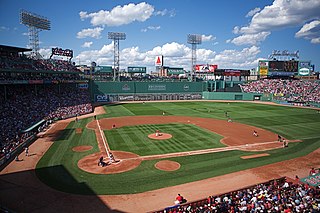
Boston is the capital and most populous city of the Commonwealth of Massachusetts in the United States. The city proper covers 48 square miles (124 km2) with an estimated population of 685,094 in 2017, making it also the most populous city in New England. Boston is the seat of Suffolk County as well, although the county government was disbanded on July 1, 1999. The city is the economic and cultural anchor of a substantially larger metropolitan area known as Greater Boston, a metropolitan statistical area (MSA) home to a census-estimated 4.8 million people in 2016 and ranking as the tenth-largest such area in the country. As a combined statistical area (CSA), this wider commuting region is home to some 8.2 million people, making it the sixth-largest in the United States.

Andover Theological Seminary is located in Newton, Massachusetts, and is the oldest graduate school of theology in the United States. Andover Theological Seminary and Newton Theological Institution merged formally in 1965 to form the Andover Newton Theological School.

Selma is a city in and the county seat of Dallas County, in the Black Belt region of south central Alabama and extending to the west. Located on the banks of the Alabama River, the city has a population of 20,756 as of the 2010 census.
After two years in this pastorate, Sellers' life takes a twist and begins to become unclear. In 1876, he moved back to Boston for a year. From 1877-1883 he lived in Taunton and Worcester, Massachusetts. The 1880 census for Taunton county lists Sellers as a black patient in the Taunton Lunatic Asylum suffering from "mania." He was known to have died of "insanity" at 41 years of age on June 4, 1883 in Worcester.


